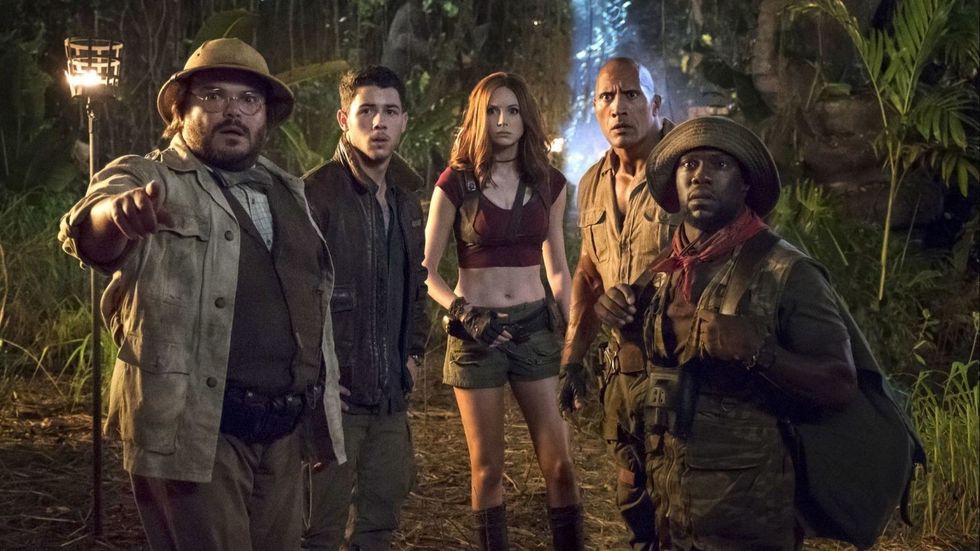Why Are There No Movie Stars Anymore?
We're in a bit of a draught when it comes to bankable names.

Oceans 11
Every weekend, movies are opening, and we're seeing a real-time test of who is actually a movie star in Hollywood.
Stars used to be the reason people saw movies in the theater. They were responsible for huge opening weekends, for movies having legs, and for them doing well overseas.
But in the current climate of IP-driven Hollywood, the titles have become the draw themselves. Those tentpoles and sequels outshone stars, and changed the entire platform of Hollywood.
Now, we're stuck in a very weird situation—one where there are very few, or maybe even no, movie stars anymore.
So, how did we get here?
Why Are There No Movie Stars?
There isn't a singular reason why the classic "movie star" seems absent nowadays. Instead, it's a shift due to several factors.
The first is that studios prioritize established franchises over original stories, lessening the impact of individual actors.
Think about your favorite Marvel actors, they haven't had the best time opening movies outside of that franchise on their own.
Another reason we're lackin in stars is that studios are also less likely to finance mid-budget films, which used to be where actors went to prove their stardom, before being given franchises.
While this doesn't mean there's a lack of incredible actors, the definition of a "movie star" is changing rather than disappearing.
The only test to see if someone actually is a star is to put them in an oirignal film and see how that opens in theaters.
Only then can we truly tell if they have power and draw.
Stardom is also spread thin. We have so many movies and TV shows now, that there's got to be thousands of names and faces competing for our attention at any given moment. Sometimes that makes stars burn brighter, but only for a quick moment until our attention spans move onto someone else.
I also think Social Media has had a larger factor in this than anymore wants to admit. The idea of stardom used to be elusive and mysterious. We almost knew nothing about htese people, except what they revealed in magazines.
Nowadays, stars are on social media, acting just like us. We have access to them, so they're losing the ethereal quality that made them so wonderful in the past.
Without Movie Stars, We're in Trouble

Ocean's 8
Credit: Warner Bros. PicturesHollywood's ecosystem is completely built around the need for stars. The bigger stars we have, the better the box office will do.
As filmmakers, we want there to be a lot of stars. That means if we're lucky enough to get them in our projects, we can get higher budgets.
Movie stars are an incredibly important part of the Hollywood ecosystem. We need them to open movies at theaters and pull in the big bucks. That keeps theaters open and making money, and makes creating theatrical movies sustainable.
Without star-opening films, studios will abandon original ideas and move the industry entirely to IP over specs. Without specs, it'll be nearly impossible to break into the industry without being rich or connected.
Hollywood just functions better when they know the people they're casting are going to get them a return on their investment. It opens up way more storytelling lanes and allows them to take risks in other areas.
What Makes a Movie Star?

Jumanji
Sony Pictures
Movie stars are not born that way, they need to have a careful succession of hits, connect with audiences, and also have the charisma to stick around.
We really need smaller movies to help put stars on the radar of bigger filmmakers, then let them spread their wings when they get those chances, and excel from there.
Factors of Stardom:
- Box Office Draw: Actors whose names consistently bring in huge audiences for their films.
- Global Recognition: Known and popular internationally, across cultures and demographics.
- Critical Acclaim: Have garnered awards or consistent praise for acting abilities, not just popularity.
- Versatility: Ability to play diverse roles and succeed in multiple genres.
- The "It" Factor: A certain charisma and intangible quality that makes audiences captivated by them.
Who Are Our Movie Stars?

Anyone But You
Sony PicturesRight now, the biggest movie star in the world is probably Margot Robbie, with Zendaya a close second. They both can open movies and create a box office draw that transcends IP.
Leonardo DiCaprio and Tom Cruise are up there as well. They each have the ability to open a movie, although Cruise has not been in a non-IP film in quite some time.
Other notable mentions would be:
That's by no means an exhaustive list, but if you're trying to package your project, you want one of these people on it.
The bottom line is, the idea of the classic "movie star" is changing, not disappearing. Success is now less about solely carrying a movie on star power alone, and more about the right combination of talent, a compelling character or project, and connection with the audience.
We need stars to support the ecosystem in Hollywood, so I hope we can find new ways to help achieve box office success for the next generation.
Let me know what you think in the comments.
- The Ways Ethan Hawke’s 'The Last Movie Stars' Gets Creative with Lost Interviews ›
- Is the Lack of Movie Stars Helping or Hurting Filmmakers Like You? ›
- Are Old Movies Stars the Only Actors That Matter? ›











